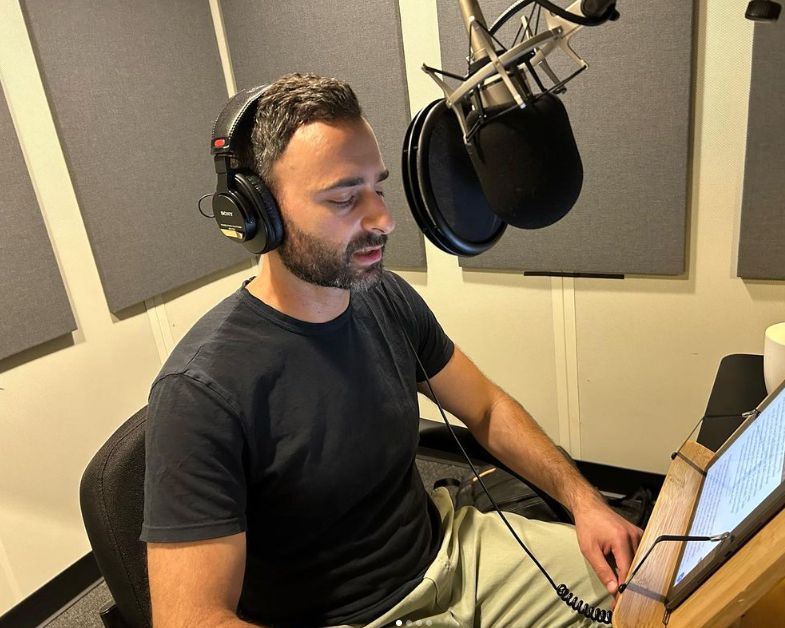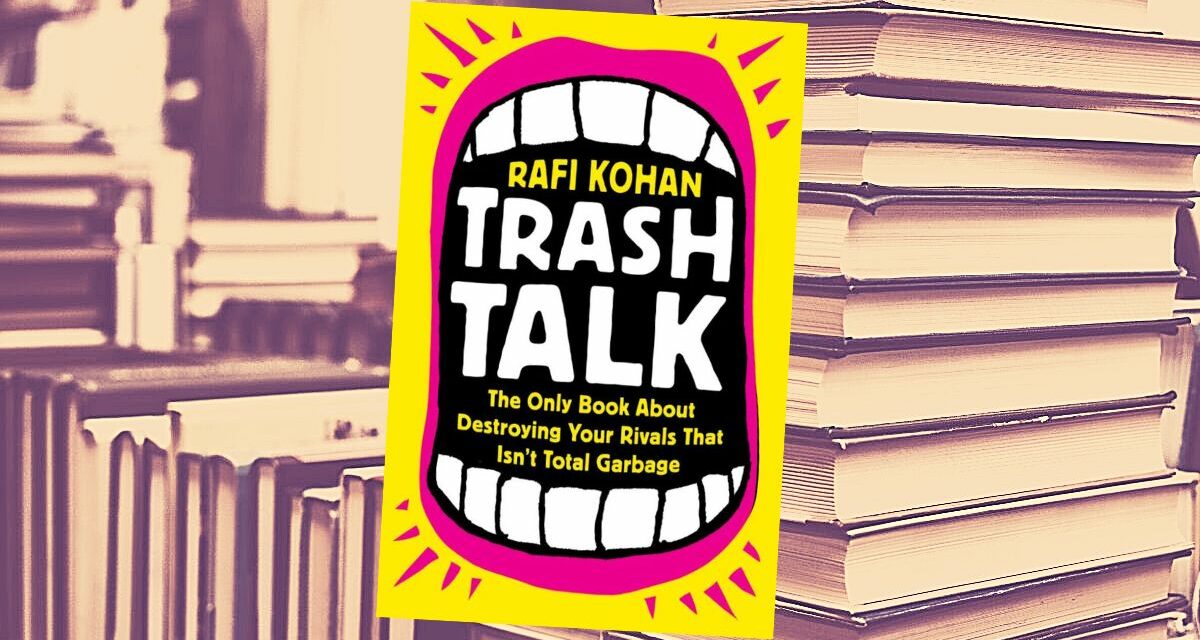A book about trash-talking? You’d better believe that there’s pro wrestling in there, brother!
“Wrestling is a business built on trash talk, in the most fundamental way,” explained Rafi Kohan, the author of Trash Talk: The Only Book About Destroying Your Rivals That Isn’t Total Garbage, which came out late in 2023 from PublicAffairs, an imprint of Hachette Book Group. (Full disclosure: I am interviewed about the use of trash talk in pro wrestling.)
Kohan is polite on the call though, and is more hugger-era Bayley than zinger-slinging Royal Rumble winner Bayley.
It might all sound like words from “The Genius” Lanny Poffo, but think about what Kohan is saying and why it matters in pro wrestling.
“One of the core functionalities of trash talk is that it raises the psychological stakes of competition. It makes it matter, it puts more on the line,” said Kohan. “And this is what invests an audience, this is what talks people into the arena. And it’s also what makes performers themselves care, it can be the motivational aspect.”
“But it can also be the thing that puts too much pressure on an opponent, and they go beyond their optimal zone of functioning, or they become distracted by, either the pressure or just the insulting comment that you make,” he said. “The way in which wrestling uses trash talk is kind of the fundamental aspect for all of these things in that way.”
There won’t be many wrestling fans that debate any of those points. The idea of talking them into the arena has been around for a long time; where it used to be in newspaper interviews, it can now be feuds on X or Instagram.
Wrestling is essentially its own section in Trash Talk, and Kohan looks at the history of trash-talking in wrestling, talking to experts like Gerald Brisco and visiting The Monster Factory school to see how it is taught. He rightfully draws parallels over how wrestling has often influenced more mainstream personalities like Muhammad Ali stealing from Gorgeous George and Freddie Blassie.
What could have been a goofy book made up of Yo Mama jokes instead walks a fine line between explaining and demonstrating, whether it’s ancient Greek poets dissing each other or basketball superstar Reggie Miller getting into the mind of John Starks.
“One of the core arguments or cases I wanted to make is that trash talk is more serious or can be viewed as a more serious subject,” Kohan told SlamWrestling.net. He said that over the “last 30 to 50 years” the very idea of trash talk has “been sort of dismissed as frivolous and unserious.”
“What drew me to it is so much of what draws everybody to it, is the kind of the challenge of it, and the disrespect of it, the antagonism and an edginess,” he said. “It’s the stuff of Twitter feuds and rap beefs and clickbait headlines, and it’s every First Take segment on ESPN. It draws us in, but it’s more than that.”
When Kohan gets going, just sit back and listen (or read).
“I wanted to give it that heft, to make the case that this is a real, actual form of human communication that has existed throughout time, can be found across cultures, and there’s more to it than that. I wanted to substantiate it.”
Trash Talk couldn’t be overly dense, but it couldn’t be example after example either.
For every “academic wormhole” that he went down, there were a dozen emails trying to get a source. He’d bounce from reading scientific studies and reports to visiting a pro wrestling school—and all the in-person visits were complicated at the time by the COVID-19 pandemic.
It paid off, in unexpected ways.
“One person leads to the next and, before it you know it, you’re standing at a military survival school in Fort Bragg,” he laughed, launching into a story of how one person does indeed lead to the next.
A moral philosopher told him how much trash talk there is in cricket. “So you start scratching that itch, and realizing that there’s this really interesting quirk of cricket, where England had been this fairly, very mentally weak team for a long time and actually started a mental toughness initiative because they were being trash talked so heavily by Australia. So you start talking to the psychologists who worked on that initiative, who turned you on to a guy who … turned you on to a guy who went on to work for the NFL, who ended up working with a guy who was a former Green Beret, who puts you in touch with SERE school neuroscientists, and then you realize that stress inoculation and mental toughness under pressure, practice under pressure [is important].”
His “giddy tangent” is both contagious on the phone and in print, where you are quickly drawn in, not sure what is next in the book, but are fascinated nonetheless.
Kohan, who lives in Atlanta, earned praise for his first book, The Arena: Inside the Tailgating, Ticket-Scalping, Mascot-Racing, Dubiously Funded, and Possibly Haunted Monuments of American Sport, which came out in the summer of 2017, and was a finalist for the 2018 PEN/ESPN Award for Literary Sports Writing. You might have seen his byline in as diverse publications as the New York Observer, GQ, Men’s Journal, Rolling Stone, The Ringer, and the Wall Street Journal.
With confidence, Kohan works himself into the narrative, whether it’s the triumph of finally getting “The Glove” Gary Payton to talk or watching Navy S.E.A.L.S. in a swimming pool in a high-pressure situation. It was that way in The Arena too. “I do enjoy the kind of immersive journalism where you’re in the mix, you’re talking to people, and some of those interactions are just kind of like instructive in and of themselves,” he said. “I tried to stick to that general rule of magazine writing where it’s, if you don’t need to be in there, cut yourself out. But, I’m perfectly comfortable with it, just because I feel like it creates an intimacy for me, like, as I’m writing it, it helps me get into the material.”
Readers will be floored by the variety of voices in Trash Talk, a ton of them female too—like basketball hall of famer Cheryl Miller, UFC fighter Holly Holm, and boxer Christy Martin.
“I do think it’s important that we recognize this as a kind of universal human behavior, not just a universal male behavior,” stressed Kohan. He would go on about chimpanzees too, if you let him.

Trash Talk’s Rafi Kohan records the audio version of his book.
The discussion opens up into where the line is for “too far” and what is and isn’t fair game. When does an in-game comment graduate from a joke to a racial slur? How has that changed over time … or the last couple of years for that matter?
“There is a line at some point that does need to be drawn, and it’s going to be different for different people. That’s the inherent problem of the line, right? Your sensitivities won’t be the same as mine,” noted Kohan.
It all brings us back to wrestling. Watching old promos, it’s impossible not to cringe at some of the language, the biases, the overt racism—even if we know they were working together to make the only color that matters, green, as in money.
“Wrestling knows so perfectly, so beautifully, with trash talk is it represents exactly that raising of the psychological stakes with the storytelling, with the cutting of promos, by drawing out a storyline and making it matter, by making this match that nobody has any good, inherent reason to care about, but we all now do. And it’s only because of the trash talk,” said Kohan.
We choose to “believe” or at least suspend disbelief.
“We choose what we make matter in life. … most things don’t have, especially competition, outside of survival, doesn’t have inherent meaning. The New York Rangers playing the Boston Bruins doesn’t have any inherent meaning, and The Rock going up against The Undertaker doesn’t have inherent meaning. We make these things matter, based on the stories,” he said, just getting started.
“And trash talk is how we create those stories. Because trash talk creates rivalry. When we talk trash to our opponent, it changes the relationship, our view of the relationship with that person, we see that person then no longer as just an opponent, but now as an actual rival.
“Rivalry relationships are defined by their increased intensity, by the fact that we have, by our willingness to be unethical or desire to win, because they mean more as a result. … When we identify with a sports team or with a wrestler, our sense of who we are is on the line. Our sense of self-worth is on the line. That becomes really important, that becomes important in a way that like tribalism and nationalism, ultimately, like things global strife and more come from, but it’s also on a more basic level, just like, yeah, that’s gonna get me to tune in.
“Nothing does that as well as professional wrestling, because that’s kind of the raison d’etre of trash talk and wrestling, right?”
Right.
Now go get a copy of Trash Talk: The Only Book About Destroying Your Rivals That Isn’t Total Garbage, you pencil-neck geek!
RELATED LINKS
- Review: Rafi Kohan’s ‘Trash Talk’ highlights wittiest, grittiest smack talkers
- Buy Trash Talk: The Only Book About Destroying Your Rivals That Isn’t Total Garbage at Amazon.com or Amazon.ca
- SlamWrestling Master Book List

